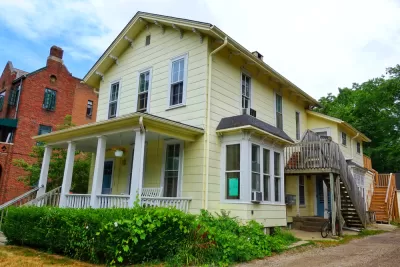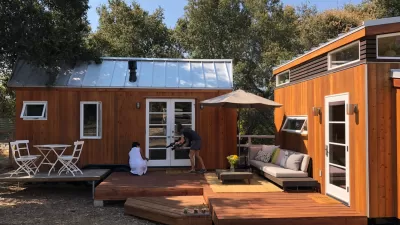Accessory Dwelling Units continue to gain steam as one approach for increasing affordability, but experts caution that housing affordability requires broader solutions.

Cities and states across the country are realizing the potential of legalized Accessory Dwelling Units (ADUs) as an inexpensive way to increase density and available housing units without drastically changing a neighborhood's character. According to Kol Peterson, author of Backdoor Revolution: The Definitive Guide to ADU Development, "there has been a dramatic uptick in ADU regulatory relaxation over the last few years." In a piece for the Washington Post, Haisten Willis assesses the benefits of ADU construction, which is experiencing a resurgence, particularly in high-cost, low-density neighborhoods on the West Coast.
California and Oregon have passed statewide legislation legalizing ADUs, and Chicago is implementing a pilot program to test the concept. Between 2016 and 2019, ADU permits in California jumped from 1,269 to 14,702, signaling a pent-up demand for "granny flats." Los Angeles, which issued 80 ADU permits in 2016, issued 6,747 in 2019.
The ADU can be an ideal housing type for seniors who want to live near their family and provides an unobtrusive way to increase available units, but advocates admit that "the devil is in the details" and more oversight is required to ensure ADU landlords can navigate the process and maintain adequate living conditions. "It still doesn’t absolve the city from the protections they need to keep for renters," says organizer Ebonée Green. Homeowners who want to build ADUs don't always know how to manage contractors or get permits, and banks, unfamiliar with the construction type, have so far been reluctant to issue loans for ADU projects.
While the growth in ADU construction is encouraging, experts warn that legalizing ADUs is only "a small tool in the box," not a broad solution to housing affordability issues.
FULL STORY: Accessory dwellings offer one solution to the affordable housing problem

Maui's Vacation Rental Debate Turns Ugly
Verbal attacks, misinformation campaigns and fistfights plague a high-stakes debate to convert thousands of vacation rentals into long-term housing.

Planetizen Federal Action Tracker
A weekly monitor of how Trump’s orders and actions are impacting planners and planning in America.

In Urban Planning, AI Prompting Could be the New Design Thinking
Creativity has long been key to great urban design. What if we see AI as our new creative partner?

Making Shared Micromobility More Inclusive
Cities and shared mobility system operators can do more to include people with disabilities in planning and operations, per a new report.

Car Designs Make it Harder to See Pedestrians
Blind spots created by thicker pillars built to withstand rollover crashes are creating dangerous conditions for people outside vehicles.

Cal Fire Chatbot Fails to Answer Basic Questions
An AI chatbot designed to provide information about wildfires can’t answer questions about evacuation orders, among other problems.
Urban Design for Planners 1: Software Tools
This six-course series explores essential urban design concepts using open source software and equips planners with the tools they need to participate fully in the urban design process.
Planning for Universal Design
Learn the tools for implementing Universal Design in planning regulations.
Appalachian Highlands Housing Partners
Gallatin County Department of Planning & Community Development
Heyer Gruel & Associates PA
Mpact (founded as Rail~Volution)
City of Camden Redevelopment Agency
City of Astoria
City of Portland
City of Laramie





























